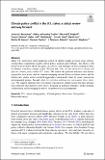Climate policy conflict in the U.S. states: a critical review and way forward
Author(s)
Basseches, Joshua A.; Bromley-Trujillo, Rebecca; Boykoff, Maxwell T.; Culhane, Trevor; Hall, Galen; Healy, Noel; Hess, David J.; Hsu, David; Krause, Rachel M.; Prechel, Harland; Roberts, J. T.; Stephens, Jennie C.; ... Show more Show less
Download10584_2022_Article_3319.pdf (803.3Kb)
Publisher with Creative Commons License
Publisher with Creative Commons License
Creative Commons Attribution
Terms of use
Metadata
Show full item recordAbstract
Abstract
Many U.S. states have taken significant action on climate change in recent years, demonstrating their commitment despite federal policy gridlock and rollbacks. Yet, there is still much we do not know about the agents, discourses, and strategies of those seeking to delay or obstruct state-level climate action. We first ask, what are the obstacles to strong and effective climate policy within U.S. states? We review the political structures and interest groups that slow action, and we examine emerging tensions between climate justice and the technocratic and/or market-oriented approaches traditionally taken by many mainstream environmental groups. Second, what are potential solutions for overcoming these obstacles? We suggest strategies for overcoming opposition to climate action that may advance more effective and inclusive state policy, focusing on political strategies, media framing, collaboration, and leveraging the efforts of ambitious local governments.
Date issued
2022-02-16Department
Massachusetts Institute of Technology. Department of Urban Studies and PlanningPublisher
Springer Netherlands
Citation
Climatic Change. 2022 Feb 16;170(3-4):32
Version: Final published version